UNCERTAIN POSSESSION:
THE POLITICS AND POETRY OF JUDITH WRIGHT
By Gig Ryan
 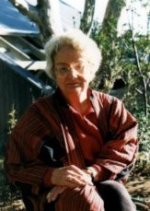 
[Above Left to Right] Bush, Braidwood, New South Wales, Australia. (Photo by Jenni Mitchell, 1997) Judith Wright, Braidwood, New South Wales, Australia. (Photo by Jenni Mitchell, 1997) Bush #2, Braidwood, New South Wales, Australia. (Photo by Jenni Mitchell, 1997)
"(For the poet R D FitzGerald) no question of moral guilt and justification arises; there is no self-questioning, for instance, on the plight of the aborigines or the denudation of the land. Indeed, reading his poetry one might think Australia to have been uninhabited before the white man's coming ..." Judith Wright, Preoccupations in Australian Poetry (1965).
For Judith Wright, whose chief theme as a poet is human relationship to nature, the prior occupancy of Australia is a dilemma she must of necessity confront. That is, questions of ownership, the legality or otherwise of that ownership, the usage to which the land is put and the results of that usage must be of utmost importance to any landscape poet in Australia. These are questions Wordsworth, who sought a similar communion with nature, need never have framed.
We have the chance to legitimize our presence here by negotiated agreement for return of lands where possible, and purchase on behalf of Aborigines, or compensation for dispossession, where it is not possible the Wilderness Society of Australia's aim, to 'preserve Australia's wilderness' assumes that it is the right of the invaders, not the original owners, which is dominant everywhere except where Aborigines may be able to prove, before our tribunals, 'traditional attachment. (Its) policy thus adds up to a confirmation and endorsement of the terra nullius judgement. That judgement has resulted, over the past two hundred years, in dispossession, destruction and the denial of all human rights to Aborigines, has turned all Aboriginal land in Australia over to destructive interests, and is the chief stumbling-block to justice and reconciliation.
If one considers the Yorta Yorta claim in Victoria in 1998: that claim failed because the Yorta Yorta people were deemed to have a discontinuous relationship to their land, that is, the more successfully white Australians have driven out or killed traditional owners of tribal land, the less able are they to be allowed access to that land or to be compensated in any way, that is, the victims of theft have no grounds on which to appeal because that which has been stolen from them has not been treasured by their continued use of it. A similarly bizarre lack of reasoning which we have now come to expect from Australian law was used by the Kennett government to take away the traditional name Gariwerd and return to the Scottish name The Grampians in respect to those hardworking pioneers who so named it. Wright, whose grandparents paid the indigenous people who worked on their land at half-pay (most paid nothing), feels acutely the illegality and injustice on which Australia has prospered. There can be no My Country - at least not yet - as Dorothea Mackellar's poem would have it in which possession is validated by love, but in its place a consciousness in Wright as far back as her first book that white Australians have dispossessed and exploited the original inhabitants and done harm to the land by inappropriate usage. She cannot truthfully write her family history or Australia's history without knowledge of the rampant so-called "dispersals". Yet in South Of My Days (1946), the country is hers, "part of my blood's country", that is, the land where she grew up. Wright's dilemma then is also Australia's.
Given that it took white Australian law until 1992 to recognize that Australia was not "terra nullius", it is not so surprising that those early poems and ballads which became popular are those which ignore the effects of white colonization on the indigenous inhabitants (though many are filled with indignation at white conditions). When these effects are mentioned by early poets - starvation, illness, prostitution, slave labour, rape, death - it is often with an acceptance of an inevitable though tragic extinction of indigenous people and an acceptance of the violence of human nature in its Darwinian progress. Many did however lament the 'plight of the aborigines', for example Kendall's The Last of His Tribe or later, James Devaney's Song of the Captured Woman - these had become almost common, though less popular, themes. Harpur's The Creek of the Four Graves (1853) is famous as a sustained romantic description of Australian landscape, not as one of few poems to relate an attack by "Savages" on 'innocent' whites. That this poem is commonly anthologized gives a skewed view of the politicized Harpur who much more typically wrote An Aboriginal Mother's Lament, perhaps an echo of the earlier Eliza Hamilton Dunlop's The Aboriginal Mother, in which the mother speaks:
"Yes! o'er the stars that guide us,
He brings my slaughter'd boy:
To shew their God how treacherously
The stranger men destroy ..."
This poem was published in the Australian in 1838, as controversy raged over the hanging of some of those men responsible for the Myall Creek massacre, a massacre controversial at the time not for the number of 'natives' killed (28 children, women and men) but for being the only time that whites were condemned to death as a result.
More unusual is The Gin, published in 1831 by the pseudonymous 'Hugo':
Their health destroyed - their sense depraved -
The game, their food, for ever gone;
Let me invoke religion's aid
To shield them from their double storm
Of physical and moral ill;
We owe them all that we possess -
The forest, plain, the glen, the hill,
Were theirs; - to slight is to oppress.
As Wright says, "There has been much in that life that was never translated into balladry - the silent war with the blacks, the change that had come over the country itself. But Australia had found her idealized hero-pattern, in The Man from Snowy River and Clancy of the Overflow and the rest, and few looked farther. The proliferation of political demagogy and the cult of the unreal bush-hero nationalist hid the beginning of the twentieth century in a kind of mist of bad writing".
That "mist of bad writing" would probably include Mary Gilmore who, like the Jindyworobak movement later, recognized indigenous culture as something uniquely Australian and therefore to be appropriated and memorialized.
Wright's first poems in The Moving Image (1946) are not only a celebration of the pioneering spirit many take them to be but are often shadowed by this parallel and tainted history. Bora Ring and Half-Caste Girl, although they may seem paternalistic now, were an expansion of those earlier Australian motifs. But Nigger's Leap, New England, which recalls a massacre, was radical in Australian poetry for having real consciousness of a country already inscribed and 'owned' by its original inhabitants.
Swallow the spine of range; be dark, O lonely air.
Make a cold quilt across the bone and skull
that screamed falling in flesh from the lipped cliff
and then were silent, waiting for the flies.
Her popularity, though, is in spite of these poems which draw attention to white Australia's fundamental and long-running conflict. Wright, that is, discomfitingly questions white ownership of the land.
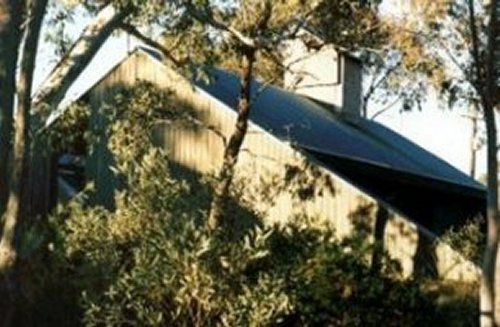
[Above] Judith Wright's house at Half Moon, Braidwood, New South Wales, Australia. (Photo by Jenni Mitchell, 1989)
Having had a continuous relationship with rural Australia and being told by her father, also a conservationist, of the history behind "Nigger's Leap" (Darkie's Head), she has been privileged to know the original and bloody foundations of white Australian history. From the 1960s on, her political awareness and activism have gnawed at governments and into her poetry. These poems and her prose works on these themes have predictably been less well-received. As she says in Advice to a Young Poet (1970):
There's a carefully neutral tone
you must obey;
There are certain things you must learn
never to say.
Wright recommended the publication of Oodgeroo Noonuccal's first book of poems and questioned the validity of white criticism of black writing. In We Call For A Treaty (which documents The Aboriginal Treaty Committee 1979 -1983, of which she was a member), one of the rights to be enshrined in that idealistic and disappeared Treaty was parliamentary representation in both State and Federal Parliaments: one indigenous member per State in each House to be elected by the indigenous people of that State. But Two Dreamtimes (1973), to Kath Walker as she then was, is a confused and sentimental poem. Like any Wright poem it contains some fine lines:
Kathy my sister with the torn heart ...
over the desert of red sand
came from your lost country
to where I stand with all my fathers,
their guilt and righteousness ...
I am born of the conquerors,
you of the persecuted.
Raped by rum and an alien law,
progress and economics ...
but it romanticizes both indigenous Australians and the landowner's guilt, attempting to make her sorrow for the current state of the land equivalent to that of the dispossessed and finishing with a plea to turn the knife to the narrator, thereby somehow atoning for white Australian history. Like The Dark Ones, this poem is historically important in alerting some Australians to unwanted truths.
On the other side of the road
the dark ones stand.
Something leaks in our blood
like the ooze from a wound ...
The facts presented in these later poems explain the elegiac pathos in Bora Ring:
The song is gone; the dance
is secret with the dancers in the earth,
the ritual useless, and the tribal story
lost in an alien tale.
Her second book, Woman To Man (1949), with its powerful five-line mostly iambic tetrameters of the title poem and in the poem Woman To Child, also astonished with what was seen to be its frank depictions of sexual romantic love and childbirth:
I wither and you break from me;
yet though you dance in living light
I am the earth, I am the root,
I am the stem that fed the fruit,
the link that joins you to the night.
Like Blake and Wallace Stevens, Wright sees love as the unifying force of life, and there are echoes of both these poets in her work, although Yeats remains an important influence. Like Yeats, Wright's poems are underpinned with a complicated and rather woolly philosophy which tends towards mysticism, but, also like Yeats, it is not necessary to know the exact intent in every line in order to appreciate the poetry.
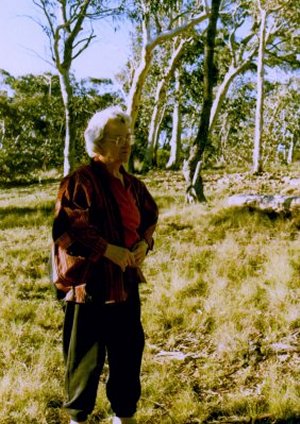
|
It is this ill-defined metaphysical aspect that is part of her political conscience. If art is seen as consummation with nature, then stains on the landscape she must enter are utterly her concern, and the stains on the Australian landscape are historical and legal - hence her fight for indigenous land rights and for a treaty and environmental - hence her work for conservation. These causes for Wright are inseparable:
The times before time, when aspects of ourselves were merged - not imaged - in the natural world, are inaccessible to our disinherited age ... Yet unless we can somehow strengthen the small bridge offered by such stories and painting (indigenous), we other Australians will never begin to heal the wounds we have inflicted on ourselves as well as on the people we have wronged.
To love the Australian country then includes responsibility towards it and, where possible, a reparation of past wrongs to its indigenous occupants. In At Cooloolah (1955), Wright recalls her grandfather "beckoned by a ghost - / a black accoutred warrior ... /who sank into bare plain, as now into time past" and cold history halts her enjoyment: |
[Above] Judith Wright in her bush at Half Moon, Braidwood, New South Wales, Australia. (Photo by Jenni Mitchell, 1989)
The blue crane fishing in Cooloolah's twilight
has fished there longer than our centuries.
He is the certain heir of lake and evening,
and he will wear their colour till he dies,
but I'm a stranger, come of a conquering people.
I cannot share his calm who watch his lake,
being unloved by all my eyes delight in,
and made uneasy, for an old murder's sake.
Along with knowledge of a bloodied past, Wright also recognizes a destructive present that implicates us all and Creation-Annihilation wrestle in At Cedar Creek (1976):
How shall I remember the formula for poetry?
This morning I have abandoned the garden.
Too overgrown to recall the shapes we planned,
it flourishes with weeds not native to this country ...
By the waterfalls of Cedar Creek
where there aren't any cedars
I try to remember the formula for poetry.
Plastic bags, broken beer bottles
effluent from the pig-farm
blur an old radiance.
But her poetic infertility is temporary as this is followed by For M.R. with the vivid, though perhaps bitter, lines: "Poems can chill, shock, / stop you cold in your tracks / functional as an axe", and she sees the poet's role, appropriately, as to "make(s) immortal what would wordless die" (The Wattle-Tree, 1955). It is language that creates meaning for Wright, as it must be for any writer, and so her need to speak the truth of white Australia's history is seen as an urgent task: without this truth, or treaty, she cannot approach her ideal of poetry.
Time locks us up in the mind,
but leaves this window, art.
In The Morning Of The Dead (1963), a reflection at her landowning grandfather's grave, written mainly in the pentameters she favours, this fusion between language and nature is elaborated:
Shape making perilous way from shapelessness;
sense budding where the blind rock knew no sense,
language carving all silence into meaning ...
For this is what the dead desire - their meaning.
"I was borne down; my work was left unfinished;
alive I turned to stone; my love was ruined;
ignorance, oppression, pain left my sight tarnished,
my world corrupt and dying."
"Oh make me perfect.
Burn with a fire of sight the substance of my sorrow.
Take what I was and find in it that truth
the universes on their holy journey
watch with their eyes of fire. Illuminate my death.
Till all the dead stand in their essence shining
Time has not learned its meaning."
There is however conflict between love of language itself and its ability to describe and perceive nature and the reverent silence that echoes nature's silence, as in Falls Country (1973):
They spoke the tongue of the falls-country,
sidelong, reluctant as leaves.
Trees were their thoughts...
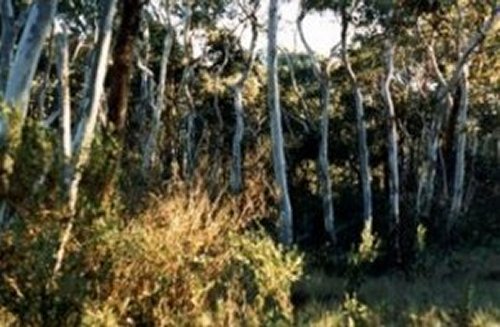
[Above] Judith Wright's bush at Half Moon, Braidwood, New South Wales, Australia. (Photo by Jenni Mitchell, 1989)
This longing for silence, obviously an evasion of poetry, deifies nature and is suspicious of the human-made as also in Summer (1985):
... I try to see without words
as they do. But I live through a web of language.
In Gum-Trees Stripping (1955), the irony of such a stance in a poem is made obvious by the effectiveness of her description:
but wisdom shells the words away
to watch this fountain slowed in air
where sun joins earth - to watch the place
at which these silent rituals are.
Words are not meaning for a tree ...
If it is possible to be wise
here, wisdom lies outside the word
in the earlier answer of the eyes.
But desire for the "wisdom" of silence is a conservative and passive stance, condemning one surely to thoughtlessness.
There is a fundamental conflict within Wright's work between the possessiveness of love and the recognition of prior claims. That is, if nature is the impetus for her work, and if language creates meaning and thus 'fusion', then the land she describes should by her effort be hers; yet she knows this is not historically the case, and that no amount of art or love can claim "her" land for herself.
once the truth is known:
Law surpasses Art.
Not the heart directs
what happens to the heart ...
Let the song be bare
that was richly dressed.
Sing with one reserve:
Silence might be best.
The ambitious For A Pastoral Family (1985) elaborates this conflict between love of country and a recognition that it is not, in a sense, hers to love. In the first section To My Brothers, she both praises and disdains her family's history:
Well, there are luxuries still,
including pastoral silence, miles of slope and hill,
the cautious politeness of bankers. These are owed
to the forerunners, men and women
who took over as if by right a century and a half
in an ancient difficult bush. And after all
the previous owners put up little fight,
did not believe in ownership, and so were scarcely human.
As Wright has explained in the inflaming The Cry For The Dead which shows the other side of her earlier family history The Generations of Men, that is, the contemporaneous history of indigenous Australians in the same area and the officially-unrecorded wars, white settlers were unable to perceive any cultivation of the soil and thus they could see no sense of ownership: "Since cultivation was the highest use to which land could be put, by biblical authority as well as by English custom, the rights of the intending cultivator were obviously overriding."
The poem attempts a reconciliation with her own past as well as with her family but the conflict of loyalties this entails can never be fully resolved. The guilt the landowners must bear comes not only from the illegality of their possession of land but also from their subsequent abuse of that land. In the second section To My Generation, she rehearses the common explanation given to justify the past, the supposed innocence of the ignorant:
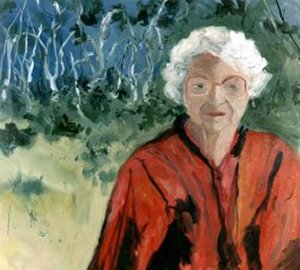
|
The really deplorable deeds
had happened out of our sight, allowing us innocence ...
If now there are landslides, if our field of reference
is much eroded, our hands show little blood.
We enter a plea: Not Guilty.
For the good of the Old Country,
the land was taken; the Empire had loyal service.
Would any convict us?
Our plea has been endorsed by every appropriate jury. |
[Above] Portrait of Judith Wright by Jenni Mitchell (oil on canvas 1989 30" x 36")
The crisp irony of this section is relieved to some extent by the fourth part Pastoral Lives with its almost Wildean social comedy:
We were fairly kind to horses
and to people not too different from ourselves ...
... We knew we had no betters
though too many were worse.
We passed on the collection-plate
adding a reasonable donation.
That God approved us was obvious.
Most of our ventures were prosperous.
As for the Dies Irae
We would deal with that when we came to it.
The conflict of the poem concludes in the final section with an acceptance of family, a truce with its past. As in the title poem that ends her book Shadow (1970), Wright's later works explore the idea of wholeness as stemming not from an idealized sacred state, but from a recognition of good and evil existing simultaneously, that is, a recognition of accumulated history:
Possessed by day, intent
with haste and hammering time,
earth and her creatures went
imprisoned, separate
in isolating light.
Our enemy, our shadow,
is joined to us by night ...
World's image grows, and chaos
is mastered and lies still
in the resolving sentence
that's spoken once for all.
Now I accept you, shadow,
I change you; we are one.
I must enclose a darkness
since I contain the Sun.
Earlier, Wright presciently had written of the negative effect of the Ern Malley hoax:
But the real damage done to the public attitude to poetry was less immediately definable, and more persistent ... What cannot be immediately understood is too often dismissed as unimportant or over-subtle, or even as a shallow attempt at self-aggrandization. So the critical atmosphere that greets the new poet in Australia is thoroughly unfavourable to experimentation or to adventurousness - a fact which perhaps has something to do with the number of poems written in the 'fifties and 'sixties in either an academic and classical, or a rumbustiously masculine, vein, both these manners being recognizably 'safe'.
The rare occasions Wright adopts a persona, employing a more conversational rather than a portentous Eliot-like tone, show how varied she can be, from the colloquial chatter of the old farm-hand in South Of My Days to the bemused and unshockable Eve in Eve to her Daughters (1966) and Eve Scolds (1976) (interesting to compare these with Gilmore's Eve-Song, 1918):
you thought his maleness chose
you out of the unshaped clay
(his huge masculine beard, his dictator-hand
giving you strength). But I -
I was the clay ... Little boys
have to invent such tales
It's insecurity - always your trouble...
But my trouble was love -
wanting to share my apples...
But you and I, at heart, never got on.
Each of us wants to own -
you, to own me, but even more, the world;
I, to own you.
It is Wright's love poems however that knell most through the consciousness of those who follow her. Love, "who cancels fear", in these poems as in John Donne's, is a reciprocal force, not an observation platform.
The eyeless labourer in the night,
the selfless, shapeless seed I hold,
builds for its resurrection day -
silent and swift and deep from sight
foresees the unimagined light.
This is no child with a child's face;
this has no name to name it by:
yet you and I have known it well.
This is our hunter and our chase,
the third who lay in our embrace.
Unlike Donne, Wright uniquely can claim love as the centre of (human) creation, not as metaphysical conceit but as fact. Wright, that is, legitimized many women's experience as delight.
For Wright, poetry aspires to resolution, a treaty between the world and oneself. Yet Wright's poetry, perhaps like any great poet's, has conflict and paradox at its core, as Australia does also - love of a damaged country she can only possess uncertainly, and love of effortless nature which can only be claimed in her language.
Eye of the earth, my meaning's what you are.
You see no tree nor cloud. That's what I take
out of your waters in this net I cast -
the net where time is knotted by the word,
that flying needle. Lakes and eyes at last
drain dry, but the net-maker still must make.
Published in Overland (Australia)
Bibliography:
Collected Poems, Wright, Judith, Angus & Robertson, 1994.
Preoccupations in Australian Poetry, Wright, J., Oxford University Press, 1965.
Because I Was Invited, Wright, J., Oxford University Press, 1975.
The Cry for the Dead, Wright, J., Oxford University Press, 1981.
We Call For A Treaty, Wright, J., Fontana, 1985.
Born Of The Conquerors, Wright, J., Aboriginal Studies Press, 1991.
Essays in Poetry: Mainly Australian, Buckley, V., Melbourne University Press, 1957.
Focus on Judith Wright, Scott, W N., University of Queensland Press, 1967.
Judith Wright, Hope, A D., Oxford University Press, 1975.
The Jindyworobaks, Elliott, B., University of Queensland Press, 1979.
Literature and The Aborigine in Australia, Healy, J.J., U.Q.P., 1989.
Poetry and Gender, Brooks, D., Walker, B., U.Q.P., 1989.
Flame and Shadow, Walker, S., U.Q.P., 1991.
Judith Wright, Strauss, J., Oxford University Press, 1995.
Bridgings, Lucas, R., McCredden, L., Oxford University Press, 1996.
South Of My Days, Brady, V., Angus & Robertson, 1998.
This Whispering In Our Hearts, Reynolds, H., Allen & Unwin, 1998.
About the Writer Gig Ryan
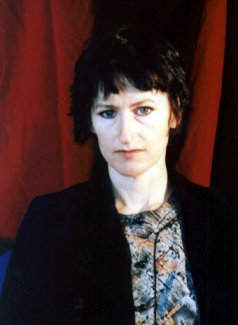
|
Gig Ryan was born in 1956. Her first book of poems, The Division of Anger, appeared in 1981 and was co-winner of the Anne Elder Poetry Award. Her other books of poetry include; The Division of Anger (1981), Manners of an Astronaut (1984), The Last Interior (1986), Excavation (1990), Pure and Applied (1998) and Heroic Money (2001). In 1988 she was awarded a Writer's Fellowship from the Literature Board of the Australia Council. Gig writes songs for her band, Driving Past. Gig Ryan's fifth book of poetry Pure and Applied won the Victorian Premier's Award for poetry in 1999. She is poetry editor at The Age, Melbourne, and a freelance reviewer. Gig lives in Melbourne, Victoria. |
[Above] Photo of Gig Ryan by Jenni Mitchell, 1997.
I Next I
Back I
Exit I
Thylazine No.2 (September, 2000) |



